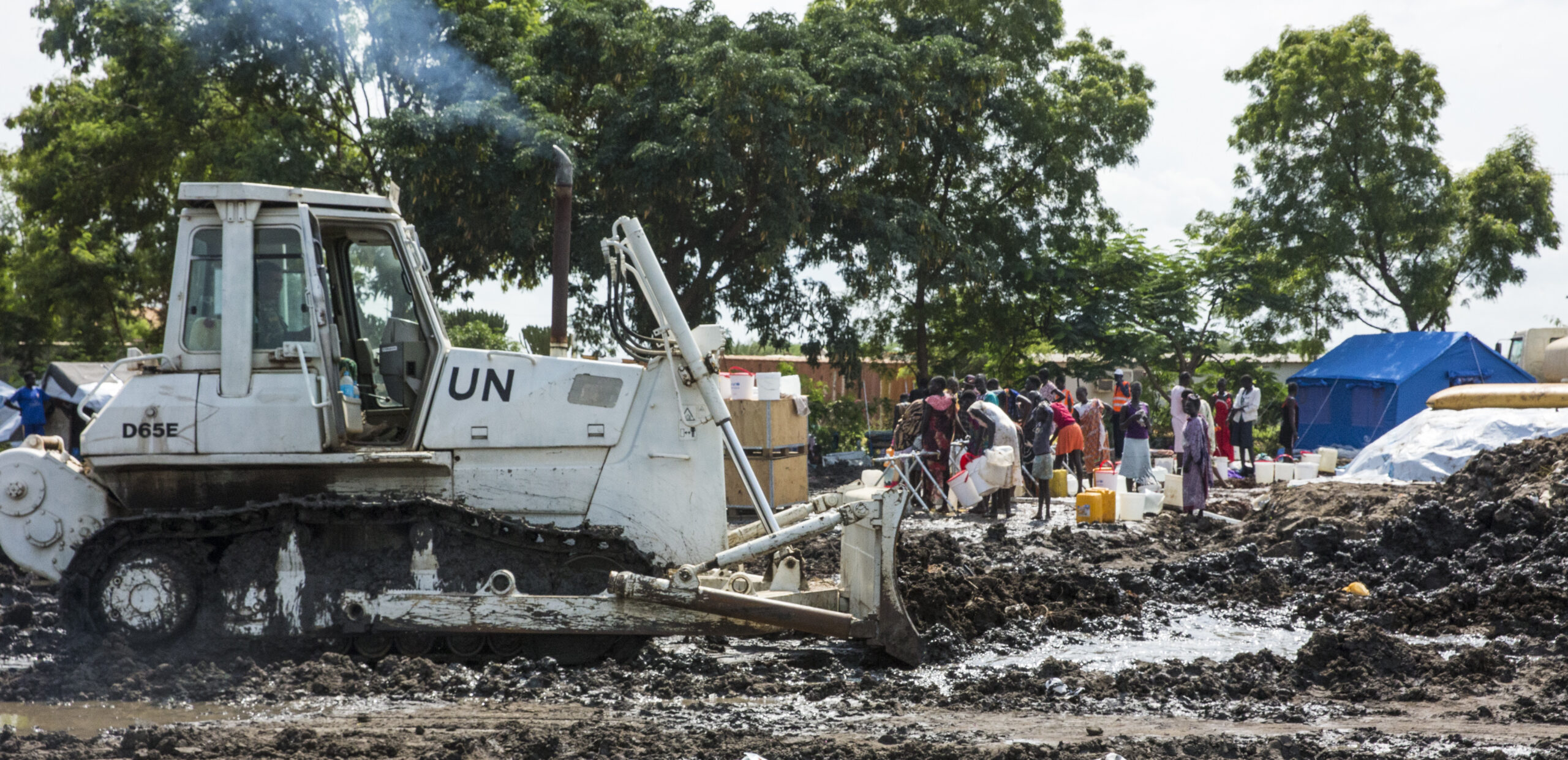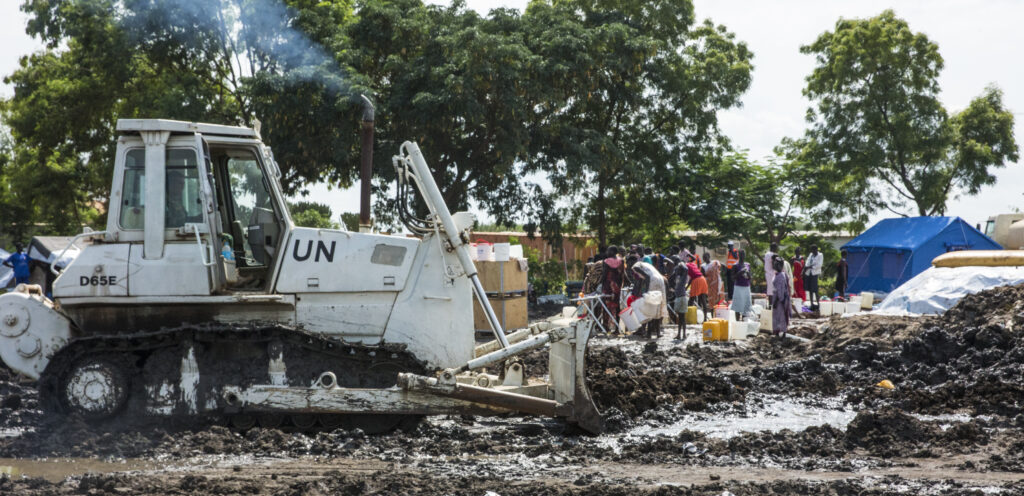
By J Nastranis
NEW YORK (IDN) – UN Secretary-General Ban Ki-moon is concerned about the Peacebuilding Fund (PBF) facing “a desperate funding shortfall” and has asked Governments to help achieve a funding target of $300 million at its pledging conference in September.
The Fund was established in 2005 through resolutions of the General Assembly and Security Council to stand alongside the Peacebuilding Commission (PBC) and Peacebuilding Support Office (PBSO) and “support activities, actions, programmes and organizations that seek to build a lasting peace in countries emerging from conflict”.
The General Assembly’s Fifth Committee in-charge of administrative and budgetary issues has allocated funds for institution-building. And recent years have seen a significant increase in institution-building mandates from the Security Council. But they were not always accompanied by realistic time frames or the necessary resources and support, noted the UN chief.
While expressing grave concern about the conditions prevailing in South Sudan, Central African Republic, Democratic Republic of the Congo, Libya and Mali, Ban said there is another, largely untold African narrative of growing economies, improved living standards and expanding democratic space.
“Our shared responsibility is to nourish these seeds of peace and prosperity,” Ban told the Security Council at the outset of an open debate on ‘Peacebuilding in Africa’, and called ‘peace in Africa a top priority’.
Nurturing institutions that were inclusive, transparent, effective and accountable would not be easy, he admitted, but they were the cement that bonded States and citizens – and while the effort might take decades, he said, communities emerging from conflict would be looking for early and tangible results.
The Security Council open debate was convened under Japan’s Security Council presidency on July 28 to strengthen peacebuilding in Africa through a more effective implementation of Resolutions S2282 and A/70/262, and the lessons learned as delineated in the 2015 Report of the PBC Working Group.
The 15-member Council underscored the importance of long-term institution-building as a critical part of peacebuilding in Africa, with speakers emphasizing the significance of addressing the root causes of conflict, the need for predictable and sustainable financing, and closer cooperation with the African Union and sub-regional organizations.
Amina Chawahir Mohamed, Cabinet Secretary for Foreign Affairs of Kenya, speaking as Chair of the Peacebuilding Commission, outlined measures that Africa had taken in response to various challenges. She explained how African countries had revitalized their economic integration initiatives while seeking institutionalized strategic partnerships with the United Nations.
Lessons learned
Describing peacebuilding as the main focus of policymakers in Africa, she said the Commission brought national and international actors together in pursuit of that goal. She also stressed the need for greater investment in governance, security and development, and early warning systems. The Commission could only be effective if policy and political discussions were complemented by predictable financial support.
Smail Chergui, the African Union’s Commissioner for Peace and Security, discussed lessons learned from recent relapses of post-conflict countries into violence. There needed to be a greater focus on coordination among all actors and integrating planning and operations.
If properly calibrated, post-conflict reconstruction and development interventions would be critical to African Union conflict-prevention strategies, he said, calling for institutionalized annual meetings between the United Nations and African Union to share lessons learned.
In the course of the debate, speakers agreed that institution-building must be a priority and that a coordinated approach was needed to address diverse challenges, from democracy and security to governance, public administration and national reconciliation.
African problems required African solutions, many speakers said. Solutions must be tailored, and both owned and led by the countries concerned.
On that point, Georges Rebelo Chikoti, Minister for External Relations of Angola, cautioned that peacebuilding encompassed many priorities and numerous stakeholders. Elections were not, by themselves, a solution for consolidating peace, and relapse into conflict was probable unless institutional capacity-building and economic recovery were dealt with first.
Addressing the challenges required redefining strategies, said Mankeur Ndiaye, Minister for Foreign Affairs of Senegal. More must be invested in prevention by tackling the root causes of conflict. Many tools were available, but political resolve was lacking. Greater support for the African Union and sub-regional organizations was critical, as they could defuse tensions early on.
Several speakers discussed national and regional initiatives taken to secure peace.
Ambassador Jerry Matjila, South Africa’s Permanent Representative to the UN in New York said the African Union had developed a Post‑Conflict Reconstruction and Development Policy, as well as the African Solidarity Initiative, which was aimed at mobilizing support from within the continent for peacebuilding measures. “All these initiatives contribute to the AU (African Union) Agenda 2063 ambition of promoting dialogue-centred conflict prevention so “that by 2020 all guns will be silent”.
Matjilla called for the broadening of the concept of peacebuilding support to include not just financing for development, but in keeping with the idea behind the African Solidarity Initiative, ‘in kind’ support such as training and capacity building of state institutions. “Such ‘in kind’ initiatives will go a long way in rebuilding the capacity of the state to ensure peace, stability and development in its country,” the South African diplomat said.
The Council had been reactionary
Among speakers from African States emerging from conflict, Rwanda’s delegate, noting that her country had moved from a failed State in a post-conflict situation to a key contributor to peacekeeping operations, said that, as the review of the peacebuilding architecture had shown, peacebuilding was both a political and technical process. She regretted that the Council had been reactionary, pressing it to play a more proactive role in countries on its agenda or where peacekeepers had been deployed.
Among donor countries, Samantha Power, the United States’ Permanent Representative to the UN said, called the prevention of conflict and promotion of stability an immensely important subject for the Council to focus on.
At a time when conflicts were re-emerging in Africa, the Council needed to reaffirm principles fundamental to ending conflict and take concrete steps to put them into practice. National ownership of peacebuilding processes, while important, could not be a pretext for inaction by the Council or the international community, yet that had happened too often. “Political leaders must be held to account to stop violence and uphold the rule of law.”
The recent violence in South Sudan demonstrated, Power said, what would happen when political leaders failed to commit themselves to peace at the start of a peacebuilding effort. Funds that could have gone towards education and infrastructure there were being diverted to avert hunger amid a man-made crisis. Gruesome atrocities were happening daily, yet there was no effort to hold the perpetrators to account.
She recalled that in 2011, the Council gave the United Nations Mission in South Sudan (UNMISS) a mandate to assist the State, but the country’s leaders failed to live up to their end of the bargain, she said, calling on the Council and the international community to “double down” on South Sudan.
In the Democratic Republic of the Congo, there were serious concerns that upcoming elections would not be held in accordance with the Constitution, she said. In Somalia, the African Union Mission in Somalia (AMISOM) deserved the Council’s immense gratitude, but durable peace would depend on the Government taking concrete steps to establish itself and extend its reach.
Military victories alone would not bring peace. Having authorized a peacebuilding mission, the Council must remain focused on national leaders’ actions, the U.S. Permanent Representative said.
The European Union’s representative said regional integration initiatives had been undermined by the fact that States often belonged to regional groups with identical or overlapping mandates. Another challenge was that regions’ political ambitions were not sufficiently underpinned with operational capacity and resources, which, in turn, limited their absorption of aid.
Anifah Aman, Minister for Foreign Affairs of Malaysia, conveyed lessons learned by his country, saying developing States could learn much from their peers. Despite its distance, Malaysia considered Africa to be a close neighbour, and despite its modest resources, it would contribute to its development.
“As a Member-Observer of the African Union and strong supporter of Africa’s revival,” Kazakhstan’s deputy permanent representative Barlybay Sadykov said his delegation “shares the region’s vision for long-term peacebuilding”.
Further: The PBC, more than ever, must serve as an advisory “bridging role” among the various departments of the Secretariat, UN organs and entities and the field operations, convening also all relevant actors, together with the various units – political, human rights, rule of law, gender as well as peacekeeping operations and political missions.
“Kazakhstan always stands ready to build peace in Africa as a steady and trusted mediator and partner;” the country’s representative.
TICAD in Kenya
Fumio Kishida, Minister for Foreign Affairs of Japan and Council President for July, spoke in his national capacity, saying that Africa and its people possessed rich culture and traditions, as well as huge growth potential. However, several African countries suffered from conflict, confrontations and terrorism.
The fourth Tokyo International Conference on African Development (TICAD), to be held in Kenya in August, would be a good opportunity to promote peacebuilding through development.
Priority areas for Japan’s peacebuilding efforts included support for institution-building, capacity-building for people running institutions and building trust. There must be innovation in peacebuilding methods, he emphasized, adding that there was ample room for expanded use of science and technology.
He announced that Japan would provide $120 million over two years to strengthen Africa’s counter-terrorism capacity. The funds would go towards human resource development, information and data collection, providing border controls with cutting-edge technology and capacity-building for police forces.
There was a need to break down silos, and the entire United Nations system, national Governments, civil society and related actors must work together in the long term. “As a foreign minister who comes from Hiroshima, peace is particularly close to my heart,” he said, reiterating Japan’s strong commitment to peace and security in Africa.
Liu Jieyi, China’s Permanent Representative to the UN in New York, said that as traditional and non-traditional security threats were interwoven, it was essential to help Africa respond to terrorism. The international community should support the continent in combating terrorist activities, regardless of the pretext targets and means, helping them build capacity and prioritize such work.
Peacebuilding should abide by national ownership and respect sovereignty, avoiding the imposition of “outside wills” on African countries. Many post-conflict African countries faced infrastructure, employment, health and social security challenges, and he urged helping them achieve early economic recovery.
Noting that there were over 2,600 Chinese peacekeepers in Africa, he said that, over the next five years, China would provide $100 million in military aid to the African Union to support creation of African Standby Force and a crisis response force. [IDN-InDepthNews – 04 August 2016]
Photo: Scenes from UNMISS Tomping POC Site, Juba. Credit: UN Photo/Isaac Billy.
IDN is flagship agency of the International Press Syndicate.












